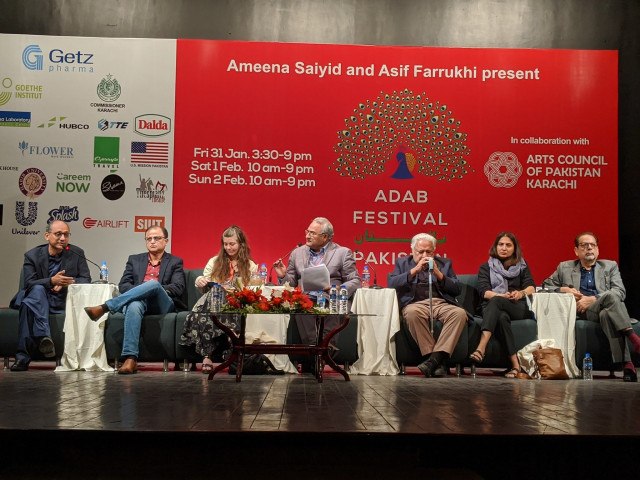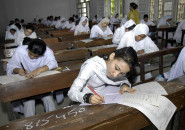Incompetent planning, odd legislation created Karachi's chaos
Panellists emphasise disconnect between govt plans and needs of city dwellers

PHOTO: Adab Fest 2020
As Syed Khawar Mehdi underlined, while moderating a panel session on "Karachi's Urban Planning, Public Spaces and Garbage Management" at Adab Festival on Saturday, it's a shame. The world progresses, focusing on urban sovereignty and new national narratives, yet here we are, still discussing the quagmire of Karachi's issues.
The problem, for renowned architect and planner Arif Hasan, is rooted in our institutions, which have been systematically destroyed, some through centralisation and others through corruption and odd legislation.
And after all, he said, cities and governments don't work without institutions, and Karachi's governance and planning are riddled with incompetence. "When there are no institutions, we cannot just run the city through wishful thinking," he pointed out.
Hasan added that the anti-encroachment campaigns carried out by the authorities were simply 'barbarism,' robbing the poor of their livelihood. The architect termed them an attempt to get rid of Karachi's destitute, without considering where they would find shelter or work. "We can't restore the city through master plans. Manage what you have; change will come gradually," he advised.
"The chaos and destruction in the city is a result of our own will and erroneous regulations," asserted heritage consultant Marvi Mazhar. "Civil society is expected to get its act together, but that's not how it works. The government has to organise and support it."
She commented that Karachi's public spaces had been designed according to the whims of the government, with little research about what the people want and need. This, she said, created a disconnect between the city and its residents.
"Parks are public thoroughfares across the world, but here, in Karachi, we have fences and gates that control movement," she observed, adding that controlling movement was the first criterion for gentrification.
Social development and policy professor Dr Severine Minot concurred that there had been too many consultations, action plans and policies that were disengaged from the opinions of Karachi's inhabitants. She further highlighted the need for law enforcement agencies to keep abreast of new laws and legislation regarding sanitation and the management of urban spaces.
"We all want to see change, but we are not very quick at wanting to change ourselves and our own practices," she commented, adding that it took the West three decades to educate people about waste management.
Urban resilience expert Farhan Anwar emphasised the need for social transformation; for him, there could be no physical transformation of the city without it. "The city cannot be resilient unless all its citizens feel like it is giving back to them," he pointed out, adding that countless internal and external reasons had turned Karachi into a fragmented, broken and decentralised city.
Meanwhile, Sindh Information and Labour Minister Saeed Ghani, while agreeing that governance played a central role, expressed his belief that the citizens too had a crucial part to play in changing Karachi's condition.
"The people of Karachi claim its ownership, but when it comes to addressing its issues, neither the political parties nor most of its citizens are willing to play their part in transforming it into a better city," he maintained. Even if the government turns its full attention to managing garbage disposal here, he said, it would still not be enough if the people did not want to keep the metropolis clean.
According to Ghani, the city began deteriorating in the mid-1980s, when those who wanted to control Pakistan realised they must control Karachi first.
The necessary transformation, he added, was not a tale of a few months or years, but he was convinced that collectively, the city's stakeholders and political parties could achieve it, if they set aside their differences.
The minister too discussed the problem of the anti-encroachment campaigns, saying they had resulted in mass displacement, homelessness and unemployment in both rural and urban areas of Sindh.
"The courts [who ordered the campaigns] should realise that it's not the structures that are being demolished for being illegal. Millions of people live inside them, and it is not possible for us to resettle those who have been displaced within a year," he asserted.



















COMMENTS
Comments are moderated and generally will be posted if they are on-topic and not abusive.
For more information, please see our Comments FAQ